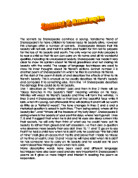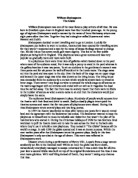Sonnet 2 Analysis
The sonnets by Shakespeare convince a young, handsome friend of Shakespeare's to have children to forever keep his beauty alive. However this changes after a number of sonnets. Shakespeare stresses that this beauty will not last, and that it is selfish and foolish for him not to prepare for the loss of his beauty and youth. The only way he can truly prepare is to rear a child so that his son can carry on his name and all his wonderful qualities, including his unsurpassed beauty. Shakespeare has made it very clear to show his opinion about his friend greediness and not sharing his beauty with the world. The usage of language techniques are used to show his inner thoughts about his friend's actions. Sonnet number 2 is another poem of Shakespeare's in which he tries to convince his friend. At the start of the poem it starts of and describes the effects of time to his friend's beauty. This is unusual as he usually describes his friend's beauty and compares it to something else. From line 1-9 Shakespeare describes the damage time could do to his beauty. Line 1 describes as "forty winters" pass and then in line 2 there will be "deep trenches in thy beauty's field" meaning wrinkles on his face. Wrinkles will wreck his friend's beauty and time will form the wrinkles. In lines 3 and 4 Shakespeare tells us that look at the beautiful face while it lasts, when it's young, but
A Midsummer Night’s Dream.
A Midsummer Night's Dream. Shakespeare's 'A Midsummer Night's Dream' is a play of romantic comedy. It is one of Shakespeare's more famous comedies and has been performed by many different actors. The production of 'A Midsummer Night's Dream' that I watched was performed in London's Regents Park by the Open Air Theatre Company. The play was successful because of the dramatical techniques and acting shown by the performers. This essay explores the techniques and acting, and compares them to a cinema production of the same play. The play takes place in the Greek City of Athens, about the same time as Shakespeare. There are three main groups of people in the play, the fairies, the lovers and the mechanicals. Each has a specific role in the plot of the play, and their separate worlds get intertwined during the middle section of the play. All the groups meet in the woods just outside of Athens, and it is here that the main section of the play happens. The fairies accidentally put a love potion into Lysander's eyes, making him fall in love with Helena. They then put the love potion into Demetrius's eyes in an attempt to rectify the situation. While this is happening the mechanicals have come to the woods to rehearse their play. Puck, one of the fairies turns Bottom into an ass, and makes Titania, the Queen of the fairies fall in love with him by using the love juice. Each of the
MacBeth
Mac Beth In 1564 a law came into force making murder by witchcraft punishable by death in Scotland alone 8,000 witches were burned to death between 1564 and 1603. In 1604 an additional law was passed in Scotland, which declared that anyone found guilty of practising witchcraft should be executed James 1 himself became personally involved with witchcraft when he and his wife were almost ship wrecked on their return to Scotland from Denmark in 1590 Dr Fian and the "witches of Berwick" were found guilty of trying to kill them by raising storms at sea. Jacobeans believed that the whole universe had an order to it, which was decided by Gog. Unnatural was against this divine order. Satan had rebelled against God directly, and he was responsible, through witches and evil spirits. In the theatre in Shakespeare day there would have been heavens, which is the roof above the stage where actors could be lowered to the stage during the play. There also would have been doors, which were used by actors. There would have been standing space where some of the audience would have been. There would be a gallery, which, would have been used for action on an upper level. There would be Inner Stage Curtained area could be opened up to show a new scene The theatre would have been in the open, so if it rained you couldn't do anything, you could leave at any time, you could watch without paying
Romeo and juliet
Dines Selvarajah Essay Title: How does Shakespeare use dramatic devices in Act 3 Scene 1 of 'Romeo and Juliet` in order to make it an exciting scene and a turning point in the play? Romeo and Juliet is an exciting play because, it begins with a public brawl between two families called Capulet's and Montague's. The scene grabs the audience's attention, it is very lively and unpredictable, and it almost makes you jump of your seat. Act 3 scene 1 echoes the theme of hatred and violence amongst the families. It is also exhilarating and moving because, it has an energetic feeling, you can anticipate something bad might happen. The fighting scene sets an aggressive atmosphere, which may shock most readers. It almost makes your speechless and static as you are drawn into the scene, which creates a climax that gradually unfolds the turning point of the play .The two directors Baz Luhrmann (old version) and Franco Zeffirelli (new version) have interpreted the scene differently as where Baz Luhrmann has made it as Mercutio was killed by accident, in Franco Zeffirelli we know he was killed straight away by the gun shot. In Baz Luhrmann's version dramatic irony was used as a close up of Tybalt's sword was shown with the blood so we all knew Mercutio was dying while the characters thought it was all a joke until Mercutio was dead. At the beginning of the scene the atmosphere was soft
Shakespeare.
Shakespeare was born in Stratford-Upon-Avon on April 23rd, 1564. John Shakespeare, William's father, was a Glover and a Whittaker. He was a highly successful and respected man of high status. His father held many public official positions: mayor, town council man, and justice of peace. Shakespeare's father could not write. In 1576, John's business went down. He stopped attending meetings and social events. Shakespeare was twelve at this time. Shakespeare's mother was Mary Arden. She came from a wealthy family who paid a handsome dowry to marry her off. While living on Henley Street, she had eight children with the Shakespeare name. Shakespeare went to Stratford Grammar School where he studied classics written in Greek and Latin. His teachers gave him the incentive to read. He was taught by two Oxford graduates, Simon Hunt and Thomas Jenkins. Shakespeare had an unusual keen observation of both nature and mankind. His education was said to have ended here. On November 27, 1582, Shakespeare married Ann Hathaway who was twenty-eight years old. On May 26, 1583, Ann bore their first daughter, Susanna. In 1585, a set of twins were born, Judith and Hamlet. Hamlet died at the age of eleven in 1596. No evidence was found of Shakespeare between the years of 1585-1592. These years of Shakespeare's life were called "The Hidden Years". During Shakespeare's Hidden Years, many people
William Shakespeare
William Shakespeare The Globe William Shakespeare was one of the most famous play writers of all time. He was born in Stratford-upon-Avon in England more than four hundred years ago. At the young age of eighteen Shakespeare wedd a woman by the name of Anne Hathaway whom was eight years older than him. Together they had a daughter called Susanna and twins Hamnet and Judith. Shakespeare decided to start travelling and to go to London. Luckily for Shakespeare just before he went to London, theatres had been opened for travelling actors for they weren't respected and a man by the name of James Burbage wanted to change that. He did this so that actors could gain more dignity. This led to the first public playhouse being built in England. This playhouse was a great success and was very popular so gradually more and more were built. In a playhouse there were three tiers of galleries which looked down to the yard where most of the audience stood. For it was only a penny to stand in the yard whereas in the gallery benches it was two pence. To sit on cushions in the gentlemen's rooms it was three pence and for six pence the well-off would sit in the Lords room. The stage came out into the yard and was open to the sky. Over the back of the stage ran an upper stage and beneath the upper stage was what was known as the tiring house. The tiring house was concealed from the audience by a
William Shakespeare.
William Shakespeare It is believed that William Shakespeare was born in Stratford-Upon-Avon, Warwickshire, on April 26th 1564, but in fact this was the date he was baptised and there is no evidence of the date he was actually born. His father, John Shakespeare, was a whittawer by profession and held several important town offices. His mother, Mary Arden, was from a fairly wealthy family. Shakespeare and his wife, Anne Hathaway got married in 1582. William was 18 and Anne was 26. Anne and William's first daughter, Susanna, was baptised on May 26th 1582. A set of twins, Hamnet and Judith, were born two years later. In 1596 Hamnet died at the age of eleven. It is believed that Shakespeare did not have a very good education. He attended Stratford Grammer School, a school that specifically served prominent citizens. It is not known how long Shakespeare attended, but it is assumed that this is the only education he received. Between 1585 and 1592 no records of Shakespeare were found. This period of his life is usually referred to as "The Lost Years". Some have speculated that he either became a schoolteacher, became a butcher's apprentice, or he was running from the law during this time. The first evidence of Shakespeare after 1592 was in London. Here he had established himself as a play writer and actor and had found a sponsor, Henry Wriothsley. However Shakespeare's work in








